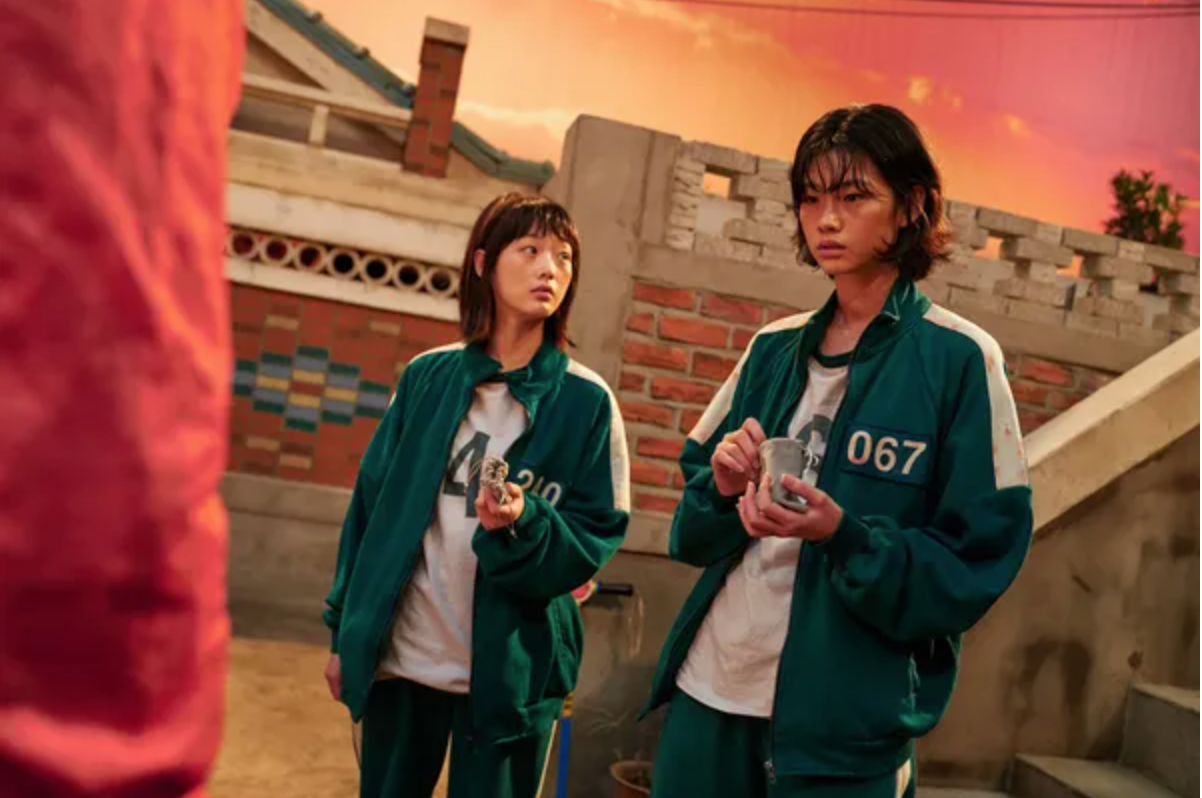Photo: Lee Yoo-mi as Ji-yeong and Jung Ho-yeon as Kang Sae-byeok in “Squid Game” (YOUNGKYU PARK/Netflix). Read the full Salon article here.
Squid Game first came to my attention via Korean friends astonished at seeing their childhood games (if horrifically perverted) onscreen as a central plot point in a blockbuster Netflix series that seemed it could be as big a Korean crossover as last year’s Oscar-winning “Parasite.” It would go on to be Netflix’s most successful original series ever, reaching 111 million viewers around the world only a month into its debut.
But chatter online from non-Koreans made it seem like the series’ main draw was a combination of absurdity and gratuitous onscreen violence. As Variety opined, “Murder is fetishized as a way to raise the stakes in a hazily political conversation,” giving viewers a voyeuristic look into the brutality of a highly unequal Korean society where death and cruelty to a putatively unemotional people is a mere cinematic style: “It’s impressive that the series found a way to be even more affectedly direct and unbothered about showing ways the human body can come apart.”
This variety of critique (as opposed to an approvingly auteur-gore-splattered Tarantino film that ironically takes if not steals much from Asian films) contains pungent whiffs of the racist “Life is cheap in the Orient” trope; i.e., the words of General Westmorland famously broadcast to the public to normalize American slaughter of women and children in the Korean and Vietnam wars. “The philosophy of the Orient expresses it: Life is not important.”
I tend to not tolerate onscreen violence well, making a point to avoid it if it is gratuitous or leans into rape culture (e.g., “Game of Thrones”), and thus came close to almost missing “Squid Game.” Its shocking originality and deeply Korean style of cinematography, the dialogue that’s a mix of pathos/bathos/humor only made me feel prouder to be Korean. It also underlined how if there is a villain, it’s seated in the root wound of the Korean people: the partitioning of the peninsula by the U.S.
Most non-Koreans seem to accept there is and always has been, somehow, a North Korea and a South Korea. Koreans, however, know the peninsula as a unified nation, intact despite constant invasions including in the 20th century, its violent colonization by Japan. Historians I know even subscribe to the shocking misapprehension that it was the Korean War the split the peninsula in two, and don’t realize that after Japan surrendered during World War II, an unwanted U.S. military occupation, as the late Professor Chong-sik Lee, has written, took a Korea that “has been an integral unit, politically, culturally and economically” but in the post war rush of divvying up the spoils and ongoing anxieties over the possible spread of communism in Asia, made Korea a pawn in the burgeoning Cold War.
Two young officers, Dean Rusk and Charles Bonesteel were given 30 minutes’ deliberation – without even a map – to split the country at a place that would keep Seoul in the south but leave enough land to appease the Soviets, who were threatening to invade, anyway. As professor Lee has described it in Journal of International Affairs, the rushed officers ultimately chose an “arbitrary line of partition at the 38th Parallel,” a line that literally amputated families, with “the Korean people playing no part in the decision.” Years later, Rusk, himself admitted, “Division along the parallel made no sense . . . as far as Korea was concerned.”
So even though George W. Bush famously labeled North Korea part of the “Axis of Evil,” he omits the fact that this state the U.S. so vigorously condemns was originally created by the U.S. itself.
The U.S.’ 75-year presence lurks everywhere in “Squid Game.” Sometimes quietly, as in the opening scenes featuring the boy-man protagonist Gi-hun (Lee Jung-jae), a divorced father with a gambling addiction, eking out a living with his elderly mother who makes pennies selling vegetables on the street. When not on one of his minor moneymaking gigs, he lollygags in their gloomy half-basement room. The same kind sunken moldy habitation is a shared motif in “Squid Game” and “Parasite”: the half-basement dwellings, called banjiha, prominent in Seoul, are actually not intended as dwellings but were mandatorily build in the ’70s as bunkers in case of North Korean attack, but now with the widening gulf of inequality, have been retroactively legalized to house the poor.
The U.S.’ post-World War II division of Korea into north and south has consequences of which were negligible for most Americans, especially the elites, but for Koreans meant life and death, families and a country in a constant state of rupture and grieving, embodied in the tragic North Korean migrant character Sae-byeok (Jung Ho-yeon). We first meet her sitting on the floor of Seoul’s version of Off Track Betting, an urchin wandering the streets not unlike the scores of orphans crying in the gutters of Seoul after their families were killed in American bombings during the Korean war. Sae-byeok picks Gi-Hun’s pocket, directly resulting in him being tortured by loan sharks (the violence of his “real” life shown to be as hellish or even more than that of Squid Game life). But later we learn Sae-byeok and her brother are marooned in Seoul as a kind of marginal class mostly invisible in society, in debt if not swindled by the gangsters who helped them out (their elder brother already dead of plague, their father shot and killed by border guards, their mother caught and repatriated back to the DPRK) and needing even more money in order, as she promises her little brother as he waits in an orphanage, to reunite what’s left of their family. The suspended Squid Game piggy bank filled with billions of won is her moon-shot.
Sae-byeok is young, a teen girl, but shows herself to be as tough and resourceful as the physically strongest (and cruelest) gangster. Her alliance with Ji-young (Lee Yoo-min), another teen, is one of the most poignant in the series. Most of the players are in their 40s; the girls’ gender and age makes them unfavorable to be picked for the various games, and so they seek each other out. The sinister outsized candy-colored play structures emphasize the losses for those two, barely out of childhood themselves: Sae-byeok, being North Korean, has never played any of these classic games, and one wonders from her closed, unsmiling face if she has ever played childhood games at all. Ji-young, the child of a horrific domestic abuse situation, has never had a childhood, either. The two of them have an easy trusting rapport starkly set against the brutality not just of the games but of the partition. Sae-byeok’s name “Dawn,” makes a mockery of her impossible, lightless situation, not unlike how in the giddy days following Japan’s Koreans celebrated the “Day of Return of the Light,” which they thought meant their country being returned to Koreans. This illusion lasted however many months before both U.S. and Russian military forced their way onto the peninsula.
One meticulous detail lost to English speakers, but that has also gone unremarked upon by Korean speaking critics is how Sae-byeok is a distinctly North Korean name, in that it is a pure Korean word, not a combination of Sino-Korean syllables. Pre-partition and in South Korea, still, Koreans use a complex generational system of yoked Chinese characters (for example my name, Myung-Ok, means clear + jade; my sister’s is Chung-Ok is righteous + jade, connecting us as siblings but also within a 12-year generation). Sae-byeok literally is the word for dawn, her younger brother’s name is Cheol, iron, and indeed a character comments on what a “strong” and manly name he has, whereas for traditional names, it’s often unclear what they mean without seeing the underlying Chinese characters, which are printed on a second line on business cards.
North Korean language tried to purge itself of Sino-Korean words altogether, something I learned as an official visitor to North Korea in 2008, where my guides explained North Korea has been purposefully keeping its language “clean.” Foreign import words, which abound in South Korea, not just English phrases and words like “beer,” “elevator” and “thank you,” but the German word “Arbeit” has come to mean “part time job.” In North Korea they no longer use the Sino-Korean word for Korea, hanguk, means People of the Han, so North Koreans call themselves People of the Joseon (after a Korean dynasty); even the North Korean word for “Korean language,” hanguk-mal, is an arch neologism: Joseon-mal, referring to the basically the same language that, when speaking with other Koreans, is casually and habitually just called woori nara mal, “our country’s language.”
Ji-young’s name thus provides the South Korean contrast. Not only classically made (wise + flower), but for artistic purposes also has a generic ring to it. It was the most popular name in Korea in 1970, and thus is a kind of demographic signifier, a Korean “Jennifer” for young women who came of age during the ’90s IMF financial crisis, exemplified by popular novel “Kim Jiyoung Born 1982” – about a young woman who can’t catch a break, no matter how hard she works (and could easily be a “Squid Game” contestant herself).
Outside of Asia, the financial crisis in Korea barely registers. I happened to be living in Seoul as a Fulbright Fellow, and the IMF and Bill Clinton “intern” scandal dominated the Korean news for months, often thrown together, like Sae-byeok and Jiyoung. Too long to go into here, the financial crisis was a consequence of geopolitical manipulations, a “dawn” of global neoliberalism, a closed market pried open, with the U.S. and other Western countries flooding Korean financial markets with speculative capital, then, for political leverage, abruptly withdrawing it, upending the Korean economy, cutting off other lending sources, forcing South Korea to accept IMF loans with strict conditions that, of course, would be advantageous to the west. This included moving to a more western-style (versus a paternalistic company that is expected to care of the worker for life in exchange for loyalty) corporate climate that led to the gutting many worker protections and benefits, which in turn led to strikes, like the one Gi-hun was in (a fictional reference to several real auto company strikes), his first step on his downward spiral from worker to desperate, loan-laden gig worker after the strike is violently suppressed. But in contrast to how the American 2008 financial crisis was experienced as American homeowners individually at fault for taking bad loans (while the actual lenders who came up with the idea of sub-prime loans, and their investment banks, got the bailouts), that year in Korea there were heartbreaking stories on the news of scores mothers giving up their babies’ dol-panjis, traditional gold rings commemorating a child’s first birthday, in hopes that this collective action could help the country’s economy, not unlike how some “Squid Game” participants abandon their self-interest for possibly futile collective action.

